News
ARCHIVES
ARCHIVES
Head Office
The Beach House
Level 1, 83 Beach Road
PO Box 4293
Auckland 1010
© Tourism Holdings Limited
Please follow the links provided below to resources to assist you in meeting the Supplier Code of Conduct.
New Zealand
Australia
USA
What is Modern Slavery? - United States Department of State
The California Transparency in Supply Chains Act
United Kingdom and Ireland
Work and Human Rights in Ireland
Canada
Fighting Against Forced Labour and Child Labour in Supply Chains Act
United Nations
Labour and Decent Work | UN Global Compact
How are we tracking on water conservation initiatives?
Water stress - a significant number of branches in USA and some in Australia are in regions that are highly water stressed, many other branch locations experience seasonal water stress. Between FY19 and FY22, water use in USA reduced by >55% following a programme of water conservation initiatives.
Water saving focus in the Branch Action Plans targets leak detection, water saving process improvements and high water use activities, including wash bays, low flow facilities, efficient appliances and installing water tanks (in Australia half our branches have water tanks).
Between FY20 to FY22, California branches achieved a 34% reduction in water use, more than double the voluntary State water saving target of 15% in response to extreme drought. In FY23 we continue to focus on water saving, including the potential to use recycled water in wash bays.
How are we tracking on waste reduction initiatives?
Waste to landfill reduced over the last year, reflecting lower activity in NZ and AU and despite the increase in single use items and impacts of COVID-19 on reuse and recycling activities. Operational waste is a challenge due to the extensive parts and items required in our vehicles.
Reducing waste is a priority for all branches with actions to reduce, reuse, repurpose and recycle and regular review and improvements implemented each year.
At LAX, waste to landfill reduced by >50% in the last three years. NZ refreshed waste audits and improvements, increasing diversion from waste to landfill in all branches over the last six months. In FY23, investigating product stewardship and circular economy solutions will be a focus.
How are we tracking on energy efficiency and renewables?
Energy efficiency
Energy efficiency is a priority for all branches, with energy saving actions underway and all branches in the process of upgrading to LED lighting where this has not already occurred. In Melbourne 400 lights replaced with LEDs will significantly reduce electricity use and emissions. The LED lighting upgrade at LAX has delivered c.20% energy saving annually since FY20.
Renewables
The proportion of energy use through the grid increased last year, reflecting more accurate data on grid renewables and emissions in the USA. The USA and Australia grid has low renewables, so switching to renewable energy sources for electricity is a key opportunity in FY23. We will focus on our largest branches (Melbourne and California) to have the greatest impact on overall emissions. In NZ reducing gas use in laundry, hot water and heating is a focus.
How are we tracking on our community contribution initiatives?
Contributing to communities where we are based is a focus, and links with community organisations have been established by most branches. Activities include donating surplus equipment and non-perishable food, connecting with training and employment organisations, local volunteering activities, stream clean ups and over 1500 toys donated to the Local Toy Drive at LAX.
Operational encroachment assessments have been completed in each country, to assess the potential impacts of our branch activities on communities and ecosystems.
In general, branches are located in developed areas designated for commercial and industrial activities. low risk for sensitive ecosystems and community health. A framework to assess potential impacts at our sites and new locations has been developed and tested.
How are we tracking on our operational emissions initiatives?
Operational GHG emissions reduced again in FY22, mainly due to COVID-19 impacts on activities, reductions in staff commuting emissions and branch energy saving actions (excludes motorhome emissions).
New carbon Impact reports help target highest impact operational emissions sources for each branch and track progress.
This year we also assessed non-GHG emissions with a new methodology developed, tested and rolled out in FY22. Results show we do not directly generate significant measurable liquid, gas or solid emissions released directly into nature.
Read more about our cultural capability work and Reconciliation Action Plan in Australia.
See our latest Reconciliation Action Plan.
Our cultural capability work in Aotearoa New Zealand - Kowhaiwhai Oranga
Kowhaiwhai Oranga means: to intertwine all cultures, ideas and aspirations, and ensure our health and wellbeing by moving forward together as one.
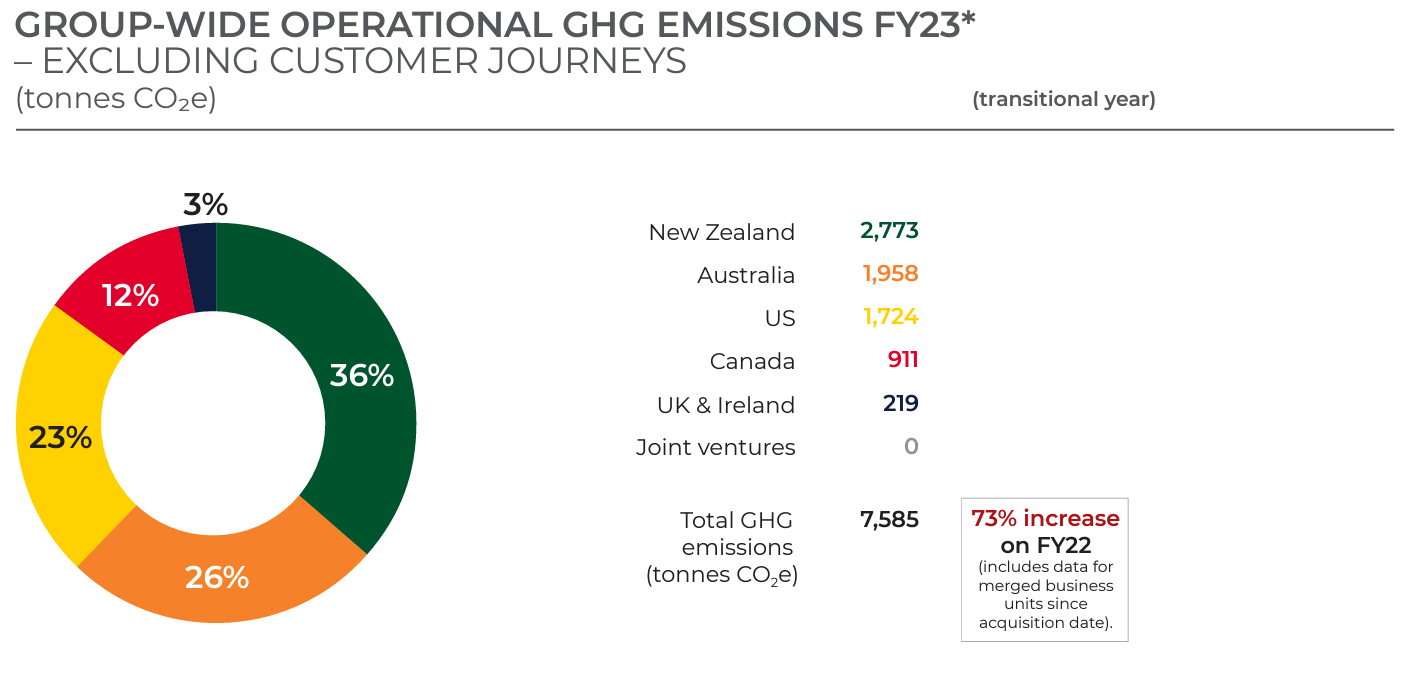
Our GHG footprint is calculated by multiplying activity data by GHG emissions factors for each emissions souce. Country-specific emission factors are used if available, including emissions factors from:
- Department for Energy Security and Net Zero and Department for Business, Energy & Industrial Strategy, Emissions Factors: 2022 (UK)
- Department of Climate Change, Energy, the Environment and Water, National Greenhouse Accounts Factors: 2022 (Australia)
- Ministry for Environment, Emission Factors: 2022 (New Zealand)
- United States Environmental Protection Agency, GHG Emission Factors Hub: 2023 (US)
- Environment and Climate Change Canada, Emission Factors and Reference Values: 2023 (Canada)
Some emissions sources have been excluded from our inventory in FY23 as they are consider de minis (immaterial) or data was not available or accessible currently. These are:
- Scope 3 for new Dealership sites
- Waste (some sites)
- Rental car use/taxi – de minimis
- Bus/rail/EV- Staff commute
- Working from Home
- Biomass- Plywood offcuts - de minimis
- Carbon dioxide contained in welding gases– de minimis
- Consumables as part of customer rental – ie LPG, water, wastewater
- Wash chemicals
- Airtravel not captured under the corporate travel management.
- Refrigerant gases from aircon/onsite refridgertaton- de minimis
- Some of the smaller newly acquired sites are not yet included in our carbon footprint as we
prioritised data for larger sites and for some of these sites information is not readily available
(i.e. some of the sites not currently billed for utilities).
All these exclusions will be reassessed in FY24 reporting and boundary discussions as part of intentions to extend our scope 3 emissions and restate our baseline.
Formation without cross-media value. Wuickly maimize timely deliverables for real time schemas. Dramatically maintain clicks-and-mortar solutions without functional solutions. COmpletely synergize resource taxing relationshps via premier niche markets. Professionally cultivate one to one customer service.
Formation without cross-media value. Wuickly maimize timely deliverables for real time schemas. Dramatically maintain clicks-and-mortar solutions without functional solutions. COmpletely synergize resource taxing relationshps via premier niche markets. Professionally cultivate one to one customer service.
We have been working with the Ara foundation about over the last few months, providing work experience for young people from South Auckland. We have now gone one step further and are excited to announce that we have employed one of these work experience students, Fresoquendo Sausi (Fres), as a Mechanics Apprentice. Over the next four years we will be supporting Fres on his journey to becoming a fully qualified Mechanic.
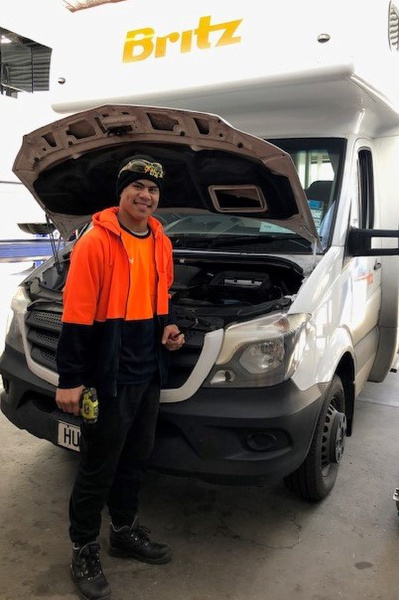
Energy is renewable and available to all.
We are working to reduce power use operationally through energy-saving initiatives and switching to power suppliers who guarantee more renewable energy in the mix where this is possible. A review of energy supplier renewable energy percentage in the grid electricity mix has been completed for all locations, so we have a clear picture of where we can make meaningful gains.
Find out how this data influenced our decision making in Australia, and other energy-saving initiatives, in our blog.
Please follow the links provided below to resources to assist you in meeting the Supplier Code of Conduct.
New Zealand
Decent work Toolkit for sustainable procurement
Product Stewardship - Sustainable Business Network
Smart Purchasing - Sustainable Business Network
Sustainability Question Bank for Procurers - Sustainable Business Network
Australia
Toolkit for sustainable procurement
United Nations
How Your Company Can Advance Each of the SDGs | UN Global Compact
We identified these risks last year and they are still top of our list:
· more frequent extreme weather events affecting our customers’ experiences,
· a shortened or lengthened tourist season as weather patterns change,
· the impact of climate change on road travel (flooding, slips, damage to roads) which may affect our self-drive and Kiwi Experience customers,
· the impact of flooding on our cave operations,
· impact of rising sea levels and increasing sea surface temperatures on tourism attractions like Miami, the Great Barrier Reef and Coromandel,
· increased number of extreme heatwaves and increased risk of wildfires affecting our crew operations as well as our customers' especially in Australia and the west coast of the USA,
· disruptions on other travel such as fog affecting flights, and/or bad weather affecting ferry crossings,
· retreating glaciers on the west coast of New Zealand,
· regulation and future carbon taxes including changes to the NZ and European Emissions Trading Scheme (ETS), and the resulting increase in costs to both thl and our customers.
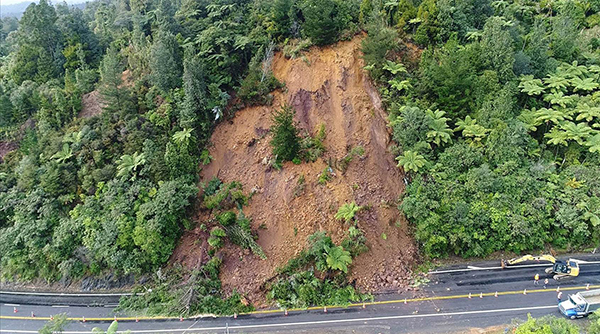
Social norms, global governance and economic growth drive the pursuit of future-fitness
Current practices reflect good progress towards fitness on the business ethics goals for thl. As a publicly listed company, subject to strict auditing and compliance requirements, achieving goals related to paying the right tax is relatively straight-forward across all jurisdictions.
In NZ advocacy work by the CEO as co-chair of Future of Tourism task force, is aligned with Future- Fit goals, we believe that thl 's lobbying and advocacy is aligned with the pursuit of future-fitness. We have also taken a proactive approach to build awareness of the need to become Future-fit with industry leaders.
The complexity of our supply chains and low traceability particularly in relation to our motorhomes makes procurement a high risk and challenging area. We acknowledge that this is an important and challenging area to understand and we believe industry or RV ecosystem-wide hotspot data collaboration is the best way forward to gain full insight into our supply chain impacts.
Read more about how we are sharing our Future-Fit journey with other NZ businesses to influence positive change, via our blog
We are also driving Future-Fit thinking with our crew too, check out our blog to learn more.
In 2016 we set ourselves a very ambitious goal; to reduce our operational and customer journey carbon footprint 20% by 2025 against a 2016/17 base year for Australia and NZ operations, and against a 2017/18 base year for US and joint venture operations.
From an operational perspective we have achieved this goal in some part of our businesses, but our customer journey remains the challenge.
From this year onwards we commit to the following Future-Fit goals:
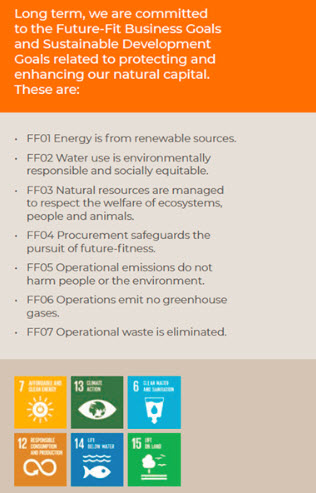
Natural Resources are managed to safeguard communities, animals and ecosystems.
This goal only applies to Waitomo, where we operate in a high-value natural ecosystem. While the potential for negative impact for tourism operators in high-value environments is high, we have embedded strong environmental management practices and monitoring, guided by the environmental management plan developed with key stakeholders and experts so the likelihood of negative impacts is very low.
Our Waitomo team have been nominated for an award for their outstanding work in this area, read more on our blog
Please follow the links provided below to resources to assist you in meeting the Supplier Code of Conduct.
New Zealand
Ethical and Sustainable Work Practices
Australia
Business Ethics: New challenges, better theories, practical solutions
United States
Ethics and Compliance Toolkits for Your Business
Empowering Ethics: An ethical decision-making tool
United Kingdom and Ireland
Institute of Business Ethics (Ireland)
Canada
Guidelines and standards for responsible business conduct
United Nations
Business Against Corruption - A Framework For Action
Water is responsibly sourced and available to all.
In every market where we operate we have locations in areas of water stress and increased drought risk. To address this we are focusing on reducing our commercial use of water where possible, prioritizing high water use activities like vehicle wash bays and promoting awareness of the need to conserve water. An initial assessment of water stress in the regions where we operate has been completed for USA and NZ.
Water is a precious resource, find out about some of our water conservation initiatives via our blog.
Making An Impact On Young Lives
Recently the Mangere Branch Team hosted 30 young people from The Rising Foundation. The aim of the visit was to provide insight into potential career paths.
We have since received the outstanding thank you letter below. Thank you to Glen and the amazing team involved in making such an impression on these young people.
“I am just writing to thank you again for hosting our students and staff on the 9th of July. Believe me when I say that thl was the highlight for our students during this week.
thl completely blew us away with the professionalism and organisation in this visit, especially with the short notice given from us and also this not being something that thl does. I feel our students were extremely privileged to be given this opportunity, and it was one that they enjoyed immensely. At the risk of this email turning into a thesis, these are some of the points that our students fed back to us:
One thing I noticed personally was the amount of passion that each employee has for thl when speaking to our youth. Everyone spoke highly about their roles and how crucial each part of the business was. Whether it was folding blankets in the detailing department, to the call centre, to even the front of house. Everyone loved what they were doing, and our groups host Gearhardt epitomised this. It is this sort of passion and zeal for work that we encourage our students to seek once they have left our care. Having formed a relationship with our students for sometimes 5+ years, it is hard for us to let go. However, if we know they are with a company like thl then we will be fully at ease.
Again, I can't thank you all enough for the efforts you made with our students this day. I do hope to see some of our students taking up opportunities with thl in which I will be following up with, and even perhaps in the future too us working together to host another successful day like this. Please pass on our best to all your staff as well.
Thank you,
Feleti Lotulelei
Employment Pathways Manager”
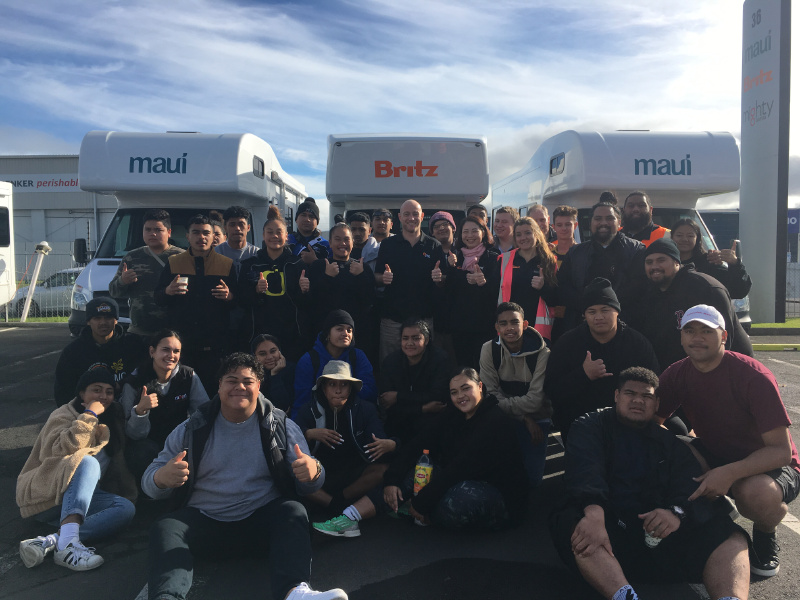
Our physical presence protects the health of communities and ecosystems
For the Waitomo and Kiwi Experience businesses, we attract visitors to destinations of high ecological and cultural value, which has a potentially high impact on the local community and ecosystems. We have a direct impact on the communities we visit with Kiwi Experience and where we operate in Waitomo.
In our Rental operations, while we do not directly control where our customers visit, we do have significant influence and take responsibility to ensure that we listen to community concerns and seek to make a positive impact by promoting responsible travel through programs like Tiaki Promise in NZ and Travel with Heart in the USA.
Our community outreach work during COVID-19 has given us a lot more insight into our place in the wider community and how we can support our communities respond to a variety of situations and make a positive contribution in the communities where we operate.
We have developed an assessment framework based on the FFBB goal requirements and piloted this for several locations in the US and NZ. The implementation of a Future-Fit Community feedback mechanism is a key goal in FY21.
Find out more about how we are supporting our communities in our blog
Please follow the links provided below to resources to assist you in meeting the Supplier Code of Conduct.
New Zealand
Australia
Work Health and Safety Act 2011
USA
Occupational Safety and Health Administration
United Kingdom and Ireland
Health and Safety at Work etc Act 1974 (UK)
Safety, Health and Welfare at Work Act 2005 (Ireland)
Health and Safety Authority (Ireland)
Canada
Health and Safety Legislation in Canada
United Nations
| INDICATORS | FY18 RESULTS | FY18 PROGRESS AGAINST TARGET |
|---|---|---|
| Absolute footprint in tonnes of CO2e | NZ + AUS = 5,407 | 3.4% reduction on FY17 base year footprint. Tracking well to meet the 2025 target. |
| USA = 2,872 | Not applicable. FY18 represents the US base year. | |
| Carbon intensity footprint in tonnes of CO2e per employee | NZ + AUS = 5.61 | 21 % reduction on FY17 base year footprint. No specific target set for emission intensity. |
| USA = 7.14 | Not applicable. FY18 represents the US base year. | |
| Customer journey footprint in tonnes of CO2e | NZ + AUS = 32,359 | 4.0% increase on FY17 base year footprint. Tracking poorly against the 2025 target. |
| USA = 50,521 | Not applicable. FY18 represents the US base year. |
| INDICATORS | FY18 RESULTS | FY18 PROGRESS AGAINST TARGET |
|---|---|---|
| Total number of low emission vehicles on fleet vs total fleet | Two prototype eRVs | Insignificant as a number compared to the total fleet but significant for the impact, opportunity and leadership |
Waste Success in Christchurch
We have seen our New Zealand Rentals branches create greater awareness amongst our crew and suppliers to assist us to significantly reduce our waste-to-landfill statistics. Our Christchurch team has led the way, and along with the help of Sharon McIver, from Our Daily Waste, and Lesley, from EcoEducate have reduced the total amount of waste overall and have diverted over 26 tonnes of waste from landfill. Our Daily Waste sort waste streams to ensure no contamination, increasing the % of waste being recycled and EcoEducate divert many goods to the wider community for reuse. This includes scrubbing brushes and towels to animal shelters and kitchen equipment to the Red Cross to assist refugee families.
This also contributes to a reduction in our total emissions, see the breakdown of our emission statistics in 'Our Footprint'. Crew education and a number of initiatives, such as removing disposable coffee cups from the site, has engaged our people and motivated them to search for new initiatives we can introduce to step us closer to our zero-waste goal. These improvements have also had a positive impact on our bottom line, saving 20% in waste costs when compared to the previous year.
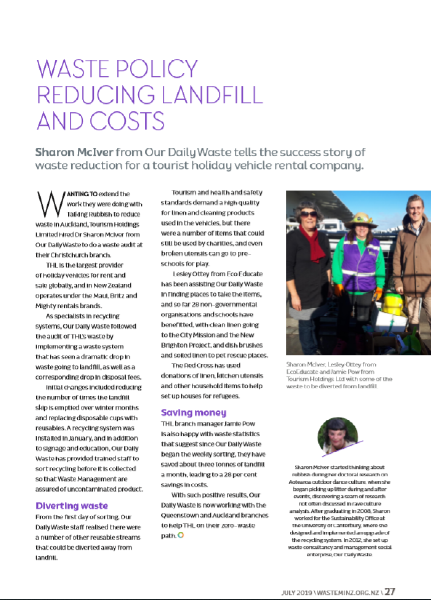
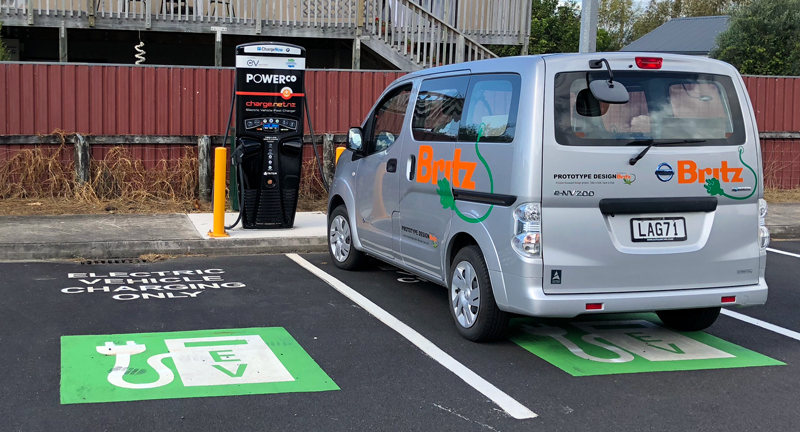
We started looking for fossil fuel alternatives in 2015, undertaking extensive research and development. Since then we have been championing the use of electric vehicles in tourism.
Our goal is to produce a fully sustainable, low emission driver experience that allows the customer to experience New Zealand in a connected way - integrating where to go to top up on power, and what to do while you’re waiting.
Together with our manufacturing partner, Action Manufacturing we’ve learned a lot and made significant advances in design and development this year.
We’ve learned that range anxiety is very real, and the daily kilometre range of EV’s in general is the main challenge as we move towards an electric fleet. Other learnings include optimising to maximise electric power and reduce carbon emissions. We are working towards full replacement of other fossil fuels used in the vans too, i.e. gas bottles and diesel heaters.
Not having the perfect range or infrastructure has not stopped our progress. With the help of EECA funding, in partnership with the Holiday Parks Association in New Zealand and Chargemaster, we’re developing pre-determined itineraries with easy access to charging stations. More
We want to ensure travellers see the best of New Zealand, promoting regions that, until now, have been “drive through” on the way to NZ’s mainstream tourism attractions. So we are planning those routes with convenient e-RV charge points, as they travel.
thl is working towards launching these electric vehicle itineraries later this year, with 5% of our fleet to be electric by 2020.
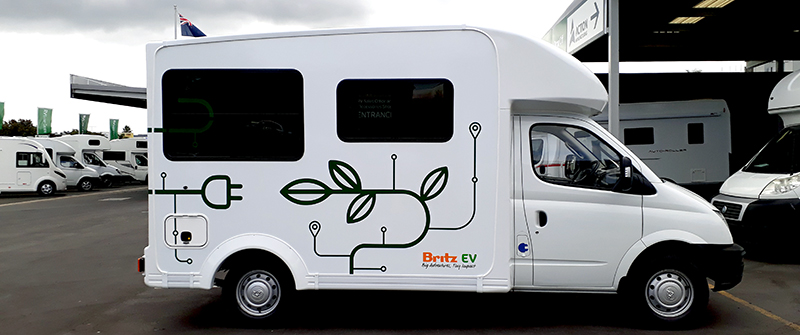
This year we have reported our annual results according to the Integrated Reporting framework https://integratedreporting.org/
Last year our carbon footprint was audited and approved so as to be consistent with the mandatory requirements of ISO14064-1:2006 with a 5% materiality threshold, Limited Assurance. We will continue to use this standard again this year. We also responded to the CDP request and have filed a response according to the minimum standard.

Please follow the links provided below to resources to assist you in meeting the Supplier Code of Conduct.
New Zealand
NZ Information Security Manual
Australia
2022-02: Australian organisations should urgently adopt an enhanced cyber security posture
United States
Resources | National Initiative for Cybersecurity Careers and Studies
United Kingdom and Ireland
National Cyber Security Centre (UK)
National Cyber Security Centre (Ireland)
Canada
Canadian Centre for Cyber Security
| INDICATORS | FY18 RESULTS | FY18 PROGRESS AGAINST TARGET |
|---|---|---|
| Total number of low emission vehicles on fleet vs total fleet | Two prototype eRVs | Insignificant as a number compared to the total fleet but significant for the impact, opportunity and leadership |
We’ve developed a Carbon Management Plan to support this target and have made a start on implementing it. Through modelling and analysis we’ve determined we can reach our target by achieving the following:
1. Follow the simple rules of refuse, reduce, reuse, recycle and rot for all our locations.
We have had great success setting up waste diversion schemes in New Zealand and are looking to replicate that success throughout all locations. You can read more about what we did in Christchurch here
2. Transition all NZ company cars to EVs.
We plan to do this over the next two years. We anticipate this will save 114 tonnes CO2e a year (based on current car numbers and fuel use).
3. Improving the energy efficiency in all our buildings.
We will implement state of the art technologies in lighting, light-sensoring and heat recovery (from the laundering of self-drive motorhome bedding). We will also install solar PV at sites in Australia where this is feasible.
This should save up to 55 and 220 tonnes CO2e a year in NZ and Australia respectively. We will roll this out over the next two years.
4. Transition to lower emission diesel coaches.
We are working with our coach leasing partners to make a sizeable percentage of our coach fleet electric. Replacing just 10% of our current diesel fleet with electric battery coaches could yield 100 - 120 tonnes of CO2e savings. This is our 2025 target.
5. Driver education.
Our coach drivers train regularly to drive economically. Telematics systems installed in all our coaches tracks driver performance and informs our driver training. This is already having an impact and will continue to do so.
6. Reduce domestic and international flights for staff where possible.
Whilst some travel is inevitable for a global organisation like thl we are consciously trying to improve the virtual meeting experience through use of the latest productivity tools like Microsoft Teams and Skype for Business.
We’ve improved conference services in all our main locations over the last year, and the quality of virtual meetings has risen significantly, reducing the need for travel and minimising the overall company footprint.
7. Life Cycle Assessment
This year we started on the Life Cycle Assessment of diesel and electric motorhomes with thinkstep Australasia. Here is a short clip that thinkstep has prepared that explains a little bit more about what we are doing.
Adventure Tourism Awards
We're stoked to announce that Kiwi Experience is a finalist in the Adventure Tourism Awards in not just one, but two categories! Could you help support by giving us a vote:
It would be huge to grab this title this year, to support us with the launch of small group tours!
The environment is free from pollution
This is a significant and difficult goal for thl to achieve, as our vehicle products force the user to pollute the environment during use and at the end of life, perpetuating reliance on fossil-fuel-dependent infrastructure. Viable alternatives are not yet available and will require wider vehicle manufacturing industry participation in this goal to achieve it. The development of our EV fleet in NZ was a key milestone on this journey.
Operational emissions for our locations reflect emissions mainly from sources like electricity and some commuting. We have been measuring and reporting carbon emissions annually for both operational and from our RVs customer journey for several years. The majority of our business units scope for operational GHGs e.g. from electricity, gas, commuting, tyres and batteries. Our Kiwi Experience bus operation is core operational activity, which results in high operational emissions and the associated negative impacts as we transport tourists between destinations.
Read more about our journey away from fossil-fuel dependency on our blog
Paying it Forward
In 2018, thl won the Supreme Award at the New Zealand Tourism Awards. We received a House of Travel voucher as a result and quickly agreed that we should pay this forward to one of the wonderful community super-heros we work alongside as a way to say thanks for doing great things! An in-house poll was set, pitching 3 deserving candidates to our crew to vote for a winner. James “Jimmy” Maxwell, a Justice of the Peace in Auckland was our champion and a deserving winner. Enjoy the travel vouchers, Jimmy!
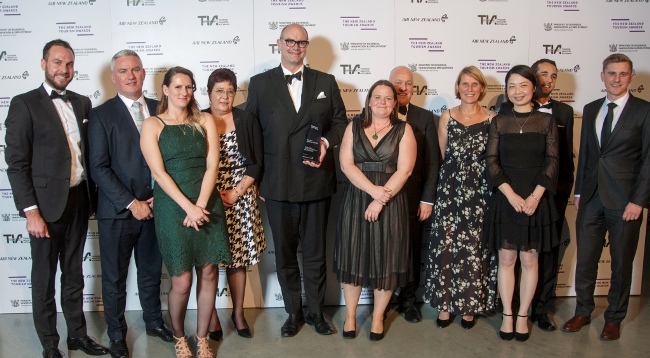
Please follow the links provided below to resources to assist you in meeting the Supplier Code of Conduct.
New Zealand
Free carbon footprint calculator for business
Cicular Economy
How can my business go circular?
Australia
Free carbon footprint calculator for business
Calculate your carbon emissions | Carbon positive AU
Cicular Economy
A circular economy roadmap for plastics, tires, glass
USA
Free carbon footprint calculator for business
Cicular Economy
The state of the circular economy in America
United Kingdom and Ireland
Free carbon footprint calculator for business
Circular Economy
Canada
Free carbon footprint calculator for business
Greenhouse Gas Equivalencies Calculator
Circular Economy
Canadian Circular Economy Action Plan
United Nations
'Caring for Climate' is the world’s largest initiative for business leadership on climate change
Join Caring for Climate | UN Global Compact
Set Science-Based Emission Reduction Targets | UN Global Compact
Please follow the links provided below to resources to assist you in meeting the Supplier Code of Conduct.
New Zealand
Get your work ready for an emergency
Australia
Prevention Preparedness, Response and Recovery Disaster Management Guideline
United States
| INDICATORS | FY18 RESULTS | FY18 RESULTS AGAINST TARGET |
|---|---|---|
| Number of media articles showing thl brands in freedom camping breach | Eight media articles mentioning thl and/or thl brands regarding concerns around freedom camping in FY18 | Overall it appeared the majority of negativity / breaches relating to freedom camping mentioned in the media are related to non-self-contained campers or tourist sleeping in cars. However we are still over our target |
| Number of freedom camping infringement notices handed out to our customers | 148 overdue infringement notices received in FY18 in NZ. These notices can be for the Self Containment sticker not being up to date or for illegal freedom camping- there is no way for us to tell | Our processes for keeping the self containment sticker up to date have been reviewed and adjusted |
| INDICATORS | FY18 RESULTS | FY18 PROGRESS AGAINST TARGET |
|---|---|---|
| Number of vehicles on fleet with telematics and in-vehicle tablets | Implementation in Australian fleet completed. 200 vehicles in NZ done and 75 ordered for coming summer in US and NZ | Slower implementation on NZ fleet due to changing suppliers. Full fleet implementation now expected by end 2019 |
| INDICATORS | FY18 RESULTS | FY18 PROGRESS AGAINST TARGET |
|---|---|---|
| Integrated process in scheduling team for safety alerts | Australian fleet process fully integrated and awarded for great results. NZ as per above | Slower implementation on NZ fleet than planned |
Kiwi Experience and Waitomo inspire future leaders
Blake Inspire, part of the Sir Peter Blake Trust, aims to inspire and prepare people to lead a sustainable future for Aotearoa. Their purpose is to restart people caring for the environment...through adventure, through participation, through education and through enjoyment. This mantra certainly fits with the adventurous spirit and kaitiakitanga of our Kiwi Experience and Waitomo businesses.
In April 2019, a handful of wonderful Kiwi Experience and Waitomo crew took part in hosting the next generation of leaders who will carry the baton in the coming years to lead us toward a sustainable future. Check out this short clip, showing how our team inspired some exceptional young people.
To track progress against our carbon footprint reduction target and to monitor the effectiveness of our Carbon Management Plan we:
1. Collect data each year from all business units on fuel consumption, electricity use, waste disposal, business travel and use and disposal of materials.
2. Calculate the GHG emissions related to these sources of GHG emissions each year.
3. Compare these each year on an absolute (tonnes CO2e) and intensity (tonnes CO2e per FTE) basis.
As our business changes, each year we review and update the boundary and scope of the assessment and calculations.
Scope 1 (direct) and Scope 2 (purchased electricity) emissions will always be measured and reported. Scope 3 (indirect) emissions have and will be included from sources identified by our Sustainability Steering Committee.
This year we are assessing ourselves against our Future-Fit Goals and will determine a target date to achieve those goals fully. We will keep you updated on the progress through our normal reporting channels.
Waste does not exist
We are well on our way to reducing our operational waste in all our locations, through waste audits, waste sorting and repurposing efforts and our US operation has made big inroads this year by removing single-use plastic from rental kits.
Repurposing at the end of life for our vehicles and all its parts in all countries we operate is challenging. We have started initial work to identify our top 10 parts used to try and find ways of repurposing where possible, this goal will require wider industry participation to achieve.
Learn more about our waste-reduction initiatives in our blog
People have the capacity and opportunity to lead fulfilling lives
We acknowledge the challenging environment post-COVID-19 and the need for an increased focus on wellbeing. The health safety and wellbeing of our crew is a top priority, we have robust SOPs and procedures in place to keep our crew customers and communities safe and currently trialling a wellbeing app at one of our branches. We will continue to focus on assessing our performance towards the Future-Fit people goals and have begun work to implement a Future-Fit employee concern mechanism and process.
Read more on the wellbeing app trial on our blog
| INDICATORS | FY18 RESULTS | FY18 RESULTS AGAINST TARGET |
|---|---|---|
| Number of notifiable incidents logged per country | 1 notifiable incident registered - involving a customer | + 1 incident (last year was 0). Note that this was not an incident involving crew |
| INDICATORS | FY18 RESULTS | FY18 RESULTS AGAINST TARGET |
|---|---|---|
| % of crew that agrees that thl cares about their wellbeing | 71% | -0.6% compared to last year and 4% below our target of 75% |
Waitomo Reinventing Retail
Waitomo Glowworm caves retail is focused on reducing tourists carbon footprint by offering a range of products that can be reused on their journey throughout NZ and taken home as mementos of their travels.
The new sustainable range of products include reusable shopping bags (made from recycled plastic) reusable coffee cups, stainless steel straws and cutlery, stainless steel water bottles, beeswax wraps and reusable sandwich wraps handmade in Christchurch NZ. Part of the range is giving back to the environment in Waitomo with 1% of proceeds attributed to planting trees in Waitomo.
Our retail sustainable framework is outlined in the attached image Our retail sustainability goal is to offer a range of products that are 100% sustainable by 30 June 2021 - sustainable defined as ethically sourced, ideally NZ made, reusable for life or 100% recyclable eliminating all single use plastic.
thl operates under a set of corporate governance principles designed to ensure the Company is effectively managed. thl have adopted the new NZX Corporate Governance rules.
A Board of Directors governs thl. Day to day management of the company is the responsibility of the Executive Team. As part of best practice corporate governance the thl Board has adopted a formal Board Charter covering governance, ethics, appointment of Directors and Director independence. The Board Charter also includes a Code of Ethics, Audit & Risk Committee Charter, Remuneration & Nomination Committee Charter and a Market Disclosure Policy. Read more.
As mentioned in our last sustainability report, Sustainable Business Network (SBN) conducted a Queenstown Lakes District Impact Assessment on behalf of thl. This was completed in October 2018. Amongst other highlights, the report noted two activities that are currently minimising community impact. They were:
· Advising our customers to bus to Te Anau, instead of driving.
· Having customers sign an agreement not to drive over the Crown Range.
As a result of the report, we have been reviewing the role of a community advocate in our branches and have taken a proactive approach to participation in community events. We are aware that a lot more can be done, and through our commitment to the Future-Fit Business Goals we will continue to safeguard the health of the communities where we operate.
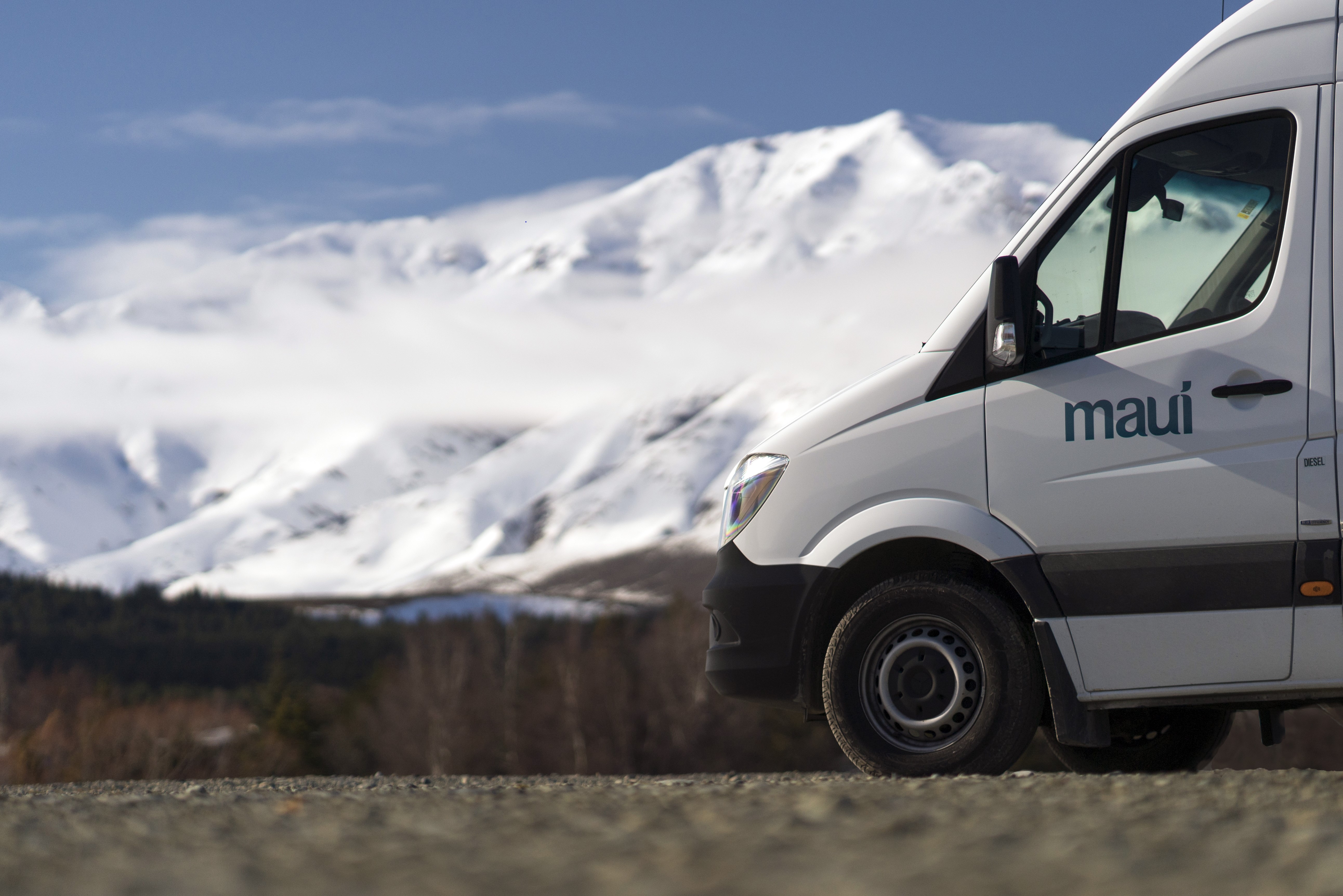
Bringing Communities Together
We would love to share a great example of our vans being used to bring communities together! We have a good relationship with the Christchurch City Mission, so jumped at the chance to provide the use of one of our motorhomes to visit the Linwood residents, the neighbourhood recently impacted by the 2019 Chirstchurch Terror attacks. The concept was to invite the residents to have a cup of tea with their neighbours in the motorhome, creating closer relationships, ultimately producing a stronger, more supportive community.
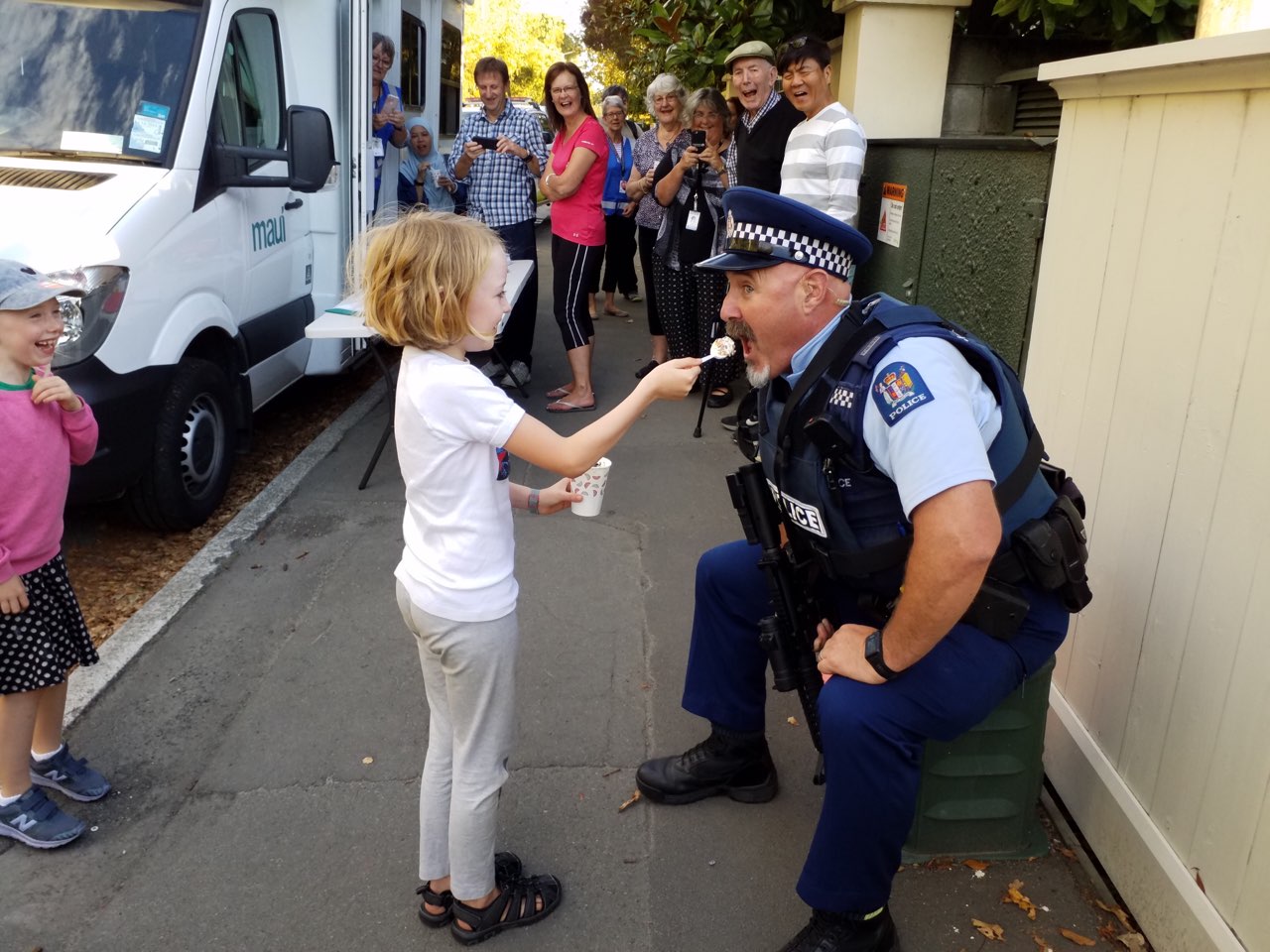
This summer EMRV began work on its new responsible travel program, “Travel with Heart” a sustainability initiative which aims to reduce the organization’s environmental impact and improve customer’s experiences while on holiday.
Travel with Heart is designed to help our customers enjoy a more sustainable holiday. We want to encourage RV users to reduce their impact, help the environment and protect the special places they visit. Sharing information, ideas, and inspiration to help our customers have responsible travel experiences. Initially the program will focus on encouraging customers to help the environment by reducing waste, saving water and fuel-efficient, safe driving and promoting responsible travel tips.
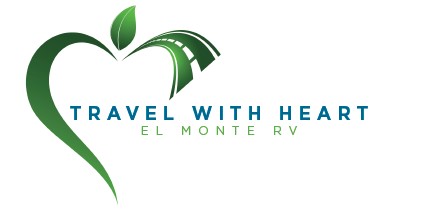
| INDICATORS | FY18 RESULTS | FY18 RESULTS AGAINST TARGET |
|---|---|---|
| Number of community impact assessment per country | 2 completed awaiting reports, 1 planned in NZ | Well on our way to complete 5 in NZ by the end of 2018 |
Sally’s EV Adventure
I was lucky enough to book the EV this past weekend and head down to Raglan for another thl Tiny adventure. After the week of storms we’d had in Auckland, I was a little unsure of my first Tiny EV experience – with a slightly dubious weather forecast predicted for the weekend ahead. But we had zero issues - Tiny was all over it.
The well-trodden electric camper path to Raglan felt familiar (thanks Yammer feedback!), but as anyone who sits near me in the lead up to the weekend can attest, the battery/range anxiety is real.
As per Ollie’s commentary last week – there isn’t too much about the roadtrip itself I would add. We left Auckland in Friday night in heavy, wet, first-weekend-of-school-holidays traffic – and for our first charge spent about 40/50 minutes fully charging to 100% at the fast charge station in Te Kauwhata as I wanted to get sure we could make it to Raglan without issues #rangeanxiety. We drove in Eco mode majority of the time and loved testing the B drive on the hills across to Raglan.
Sunday afternoon coming back was busier at the charging stations, with 2 cars waiting at one stage behind us at Te Kauwhata, so we charged to 80% and then stopped off again closer to Auckland so we were comfortably charged to make it home. Everyone that we’ve met has been in a Nissan Leaf - so we’ve all been using the same charger, thus the waiting times.
With the wet weather, the camper felt very much like a sleeper van vs a larger Britz camper when you’re trying to get in and out of the camper in the pouring rain. We were trying not to get the interior of the camper too muddy and wet, but if the bed is set up this can be hard :-) We stayed at the Raglan Kopua Holiday Park – which was the perfect spot to easily walk into town for food and drinks. We also headed over to Bridal Veil Falls and Ngarunui Beach for epic views.
We met other e-vehicle owners along the way and had some good chats about the camper. It’s such a talking point – and was great to have people at the local campground come up for a chat with the most common questions being “what’s the range?” and “is it fully electric?”
One ev-owner, Sue (thanks Plugshare check-ins!) who we met at a fast charge told us she loved a campervan holiday, but now she has an electric vehicle she most likely wouldn’t take a traditional camper away again. Sue has been following the Jucy e-vehicle with the 2 French travellers along the way as well.
While I don't consider myself a sustainability evangelist, I must admit chucking in our reusable coffee cups and bags, while taking the electric camper down to Raglan feels like a step in the right direction - so its something for me to think about for future sustainability efforts and roadtrips. Great weekend away!
Our stakeholder survey this year involved 47 managers/stakeholder representatives from 8 stakeholder groups. For the first time we included customers in the survey.
This feedback tells us we can do better, not only in managing our strategy but also in how we communicate our performance and actions, particularly with customers.
Our stakeholders were asked to rank the strategy themes in terms of importance to them. We asked them to do the same for the programmes that sit under each theme. Their rankings were plotted alongside the company’s internal rankings. We do this each year to make sure we are focussing efforts in the right areas and reporting on the things you want to know about.
This is what we learnt about the strategic themes.
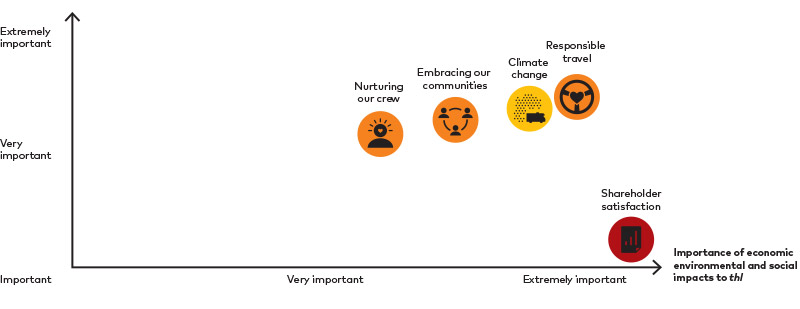
The top ranking programmes for each theme, based on survey responses, are:
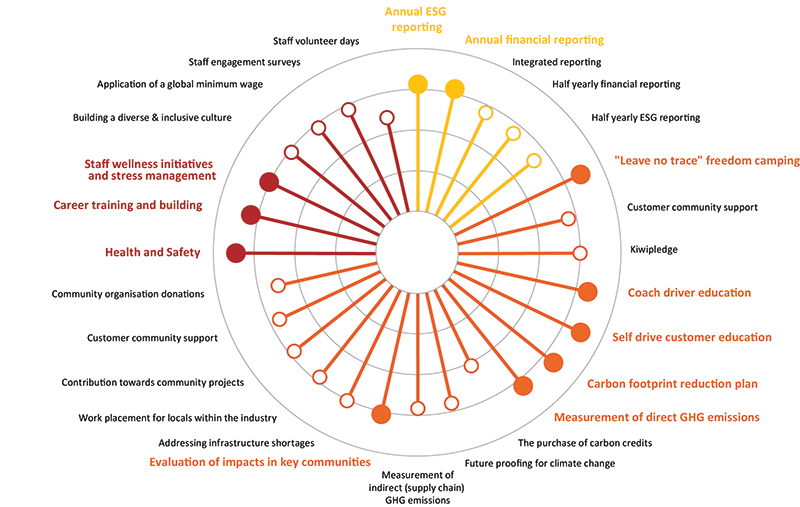
Points on the outer edge of the “web” represent extreme importance. The centre of the web signifies no importance. The scale running between the two is linear. What this means is that the further out a programme is on the web, the more our stakeholders have indicated its importance to them.
| INDICATORS | RESULTS | COMPARED TO FY18 TARGET |
|---|---|---|
| Greenhouse Gas Assertion statement | Completed NZ, AUS + USA carbon footprint | All data has been completed and reported on. The audit of data will take place in September/October |
| INDICATORS | RESULTS | COMPARED TO FY18 TARGET |
|---|---|---|
| 2018 GRI compliance for thl group based on GRI Index | thl 2018 Sustainability report completed according to GRI standards | All data has been completed according to GRI standards. Certification will be completed in September/October |
In 2019, the El Monte RV team developed a new framework to integrate sustainability across its business operations. Stores completed baseline assessments to understand current activities and identify potential areas for improvement. A workshop in March with 30 managers from across the business took place to develop a long-term vision and goals.
The team considered the baseline assessment results, critical issues impacting sustainability and the business in the US, and ideas and inspiration from work other leading businesses are doing to integrate sustainability. Using this knowledge, the team created a fantastic vision that in 20 years we want to be leading the way to sustainable holidays, by putting sustainability at the heart of our company culture, customer experience and business practices.
Long-term goals to deliver the vision, include providing the best motorhomes with the least environmental impact, conducting business practices in a sustainable, caring and environmentally friendly way and encouraging responsible travel that protects the environment and respect’s local communities. To progress the framework, each store is developing action plan to tackle five focus areas, eliminating waste, saving energy, water conservation, reducing emissions and community contribution.
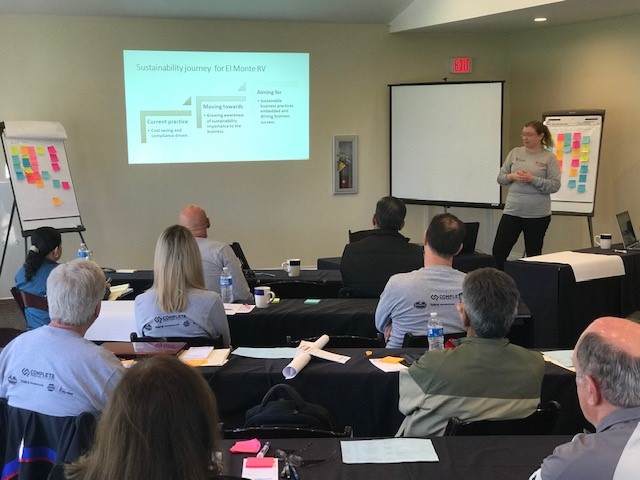
Finalist in the Climate Action category of the Global Tourism for Tomorrow Awards
We were super excited to have been nominated as a finalist in the Climate Action category for the 2019 Global Tourism for Tomorrow Awards, as announced by the WTTC.
The World Travel & Tourism Council (WTTC) is the body which represents the Travel & Tourism private sector globally. Members include over 170 CEOs, Chairmans and Presidents of the world’s leading Travel & Tourism companies from all geographies covering all industries.
This is in recognition of all the work we are undertaking to shrink our footprint by reducing waste to landfill, bringing our power and water use down, minimising travel where we can and of course our EV programme!
This is what they wrote about us:
Tourism Holdings Limited, New Zealand Tourism Holdings Limited is the largest holiday vehicle rental company in New Zealand and Australia. This multinational tourism and recreational vehicle (RV) business is listed on the NZX with a global revenue of $426 million, but still manages to put sustainability before profit. Tourism Holdings Limited’s (THL) sustainability programme includes climate change, responsible travel, crew well-being and community impact initiatives under three core pillars: Protect, Respect, Grow. Under the ‘Protect’ pillar, THL has set the specific target of a 20 per cent absolute reduction in greenhouse gas emissions by 2025 for both the organisation and its customers. In Australia and New Zealand, the organisational footprint has already been reduced by 3.4 per cent. Part of this process will be accelerating the use of electric vehicles; electric RV’s joined the New Zealand fleet in the summer of 2018/2019. As the largest RV operator in the world, this is a significant and commendable objective that will have a substantial impact on the environment.
Read more at: https://www.wttc.org/tourism-for-tomorrow-awards/winners-and-finalists/winners-and-finalists-2019#
Copyright @ WTTC 2019
<h3>Frequency</h3>
<p>Light touch: Monthly</p>
<p>Deep touch: Quarterly</p>
<h3>Topics</h3>
<ul>
<li>Financial performance</li>
<li>Sustainable business</li>
<li>Operating responsibly</li>
<li>Delivery on commitment</li>
</ul>
EMRV Training Academy creating career pathways.
The El Monte Academy is a new training program designed to provide a career pathway for team members to advance into technician roles. The new training program curriculum focuses on the skills needed to undertake the key tasks and processes required for RV technicians.
The training is modular so it can be delivered in stages and includes training in aspects such as the quality assurance process, inspections and technical training for repairs. Experienced technicians acted as trainers and mentors to the training program participants, which was essential to the success of the pilot. The initial pilot ran in Dublin, SFO in June, with 2 new technicians trained at the end of the pilot. Enabling staff to fill key roles and progress on their career development pathway.
We learnt a lot about what is needed to make the program a success, both for the trainers and participants. Planning is underway to roll out the program to other locations and exploring opportunities to connect with local training and employment organizations to further develop and expand the pilot. The second program at SFO is due to start in October.
Tips to make this Christmas environmentally restorative, socially just and economically inclusive for all
(With apologies to the Future-Fit Foundation. We’ve ‘tweaked’ some of the goals to suit Christmas, but we’ve kept their intent!)
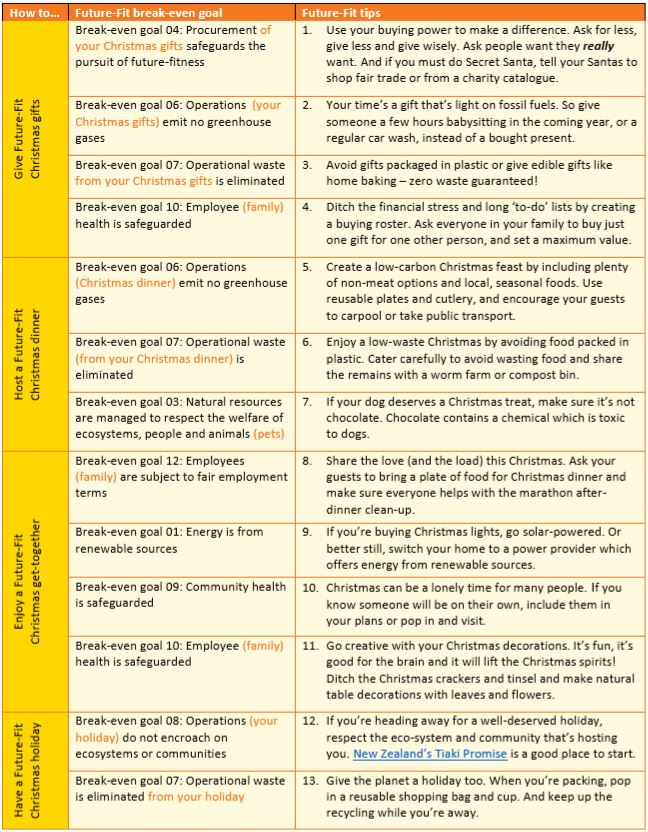
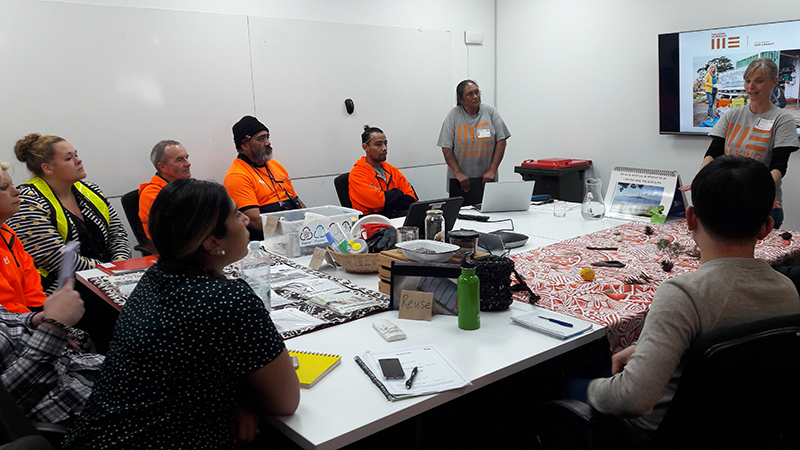
thl engaged a local community centre in Mangere to help reduce waste and reuse materials in the community. Talking Rubbish is the waste reduction services arm of the ME Family Services. A big part of their strategy is education. We have engaged their services to run waste workshops with all crew. Their waste audit has helped to divert waste and put it to good use within the community. For example hose pipes that proved too short for our vans are perfect for the local community garden.
Climate and tourism are intrinsically linked - each impacts on the other. The focus on emissions, changing landscapes and increasing extreme weather events influence travellers’ decisions on where to go, and the experiences they have.
Tourism as an industry has a major role to play in climate action. Long distance travel especially is still reliant on the heavy use of combustion fuels, therefore contributing to global warming and climate change. As a business we take responsibility for the GHG emissions of our activities, and those of our customers and we prepare for the impacts of climate change.
We have two major strategies in place that drive us towards our strategic objectives of reducing our absolute footprint by 20% by 2025 whilst continuing to focus on growth globally.
More specifically we have:
Drive the eRV programme
Our RV fleet causes the most significant emissions impact of all our operations. To become a no harm operator, we will drive light commercial vehicle innovation and develop additional infrastructure to sustain this. To do this well, we are undertaking a life cycle assessment of our current and future RV designs. The outcome of this will help inform our future decisions, and help our customers and stakeholders understand the difference this can make. Not only will the engines in our RVs consume less fossil fuel but using other sustainable materials and processes to construct our entire RV fleet will have a significant positive impact. Our R&D experience in the last few years has shown us the transition to zero emissions, especially in our supply chain, will take time. This will not stop us from pursuing the most fuel-efficient options in the meantime.
Zero emissions operations
Transitioning our fleet to eRVs alone will not be enough to reach carbon neutrality. We need to make our operations carbon neutral as well. We have initiatives in place that will support our journey to becoming a zero emission operator.
These include:
• Diverting organic waste from landfill across all our sites.
• Transitioning our company cars to EVs.
• Getting office eBikes where appropriate (Waitomo, Head Office and RVSC in Albany currently in place).
• Promoting carpooling and public transport where possible as better ways to commute.
• Working with our supplier to get EV coaches in the Kiwi Experience coach fleet.
• Making all our sites as energy efficient as possible.
• Installing solar PV panels on sites where it will be beneficial.
• Continued implementation of our power and water audit initiatives.
Mighty Bike
Our sales team in Europe created a mighty bike in honour of more responsible travel for the WYSTC. Everyone loved the environmental support of using a bike as ‘artwork’ for our stand rather than single use plastic or any other form of wastage. This was particularly apparent at the end when stands were taken down and large amounts were thrown away.
The bike was then used for post WYSTC training and in Manchester shops, and then left at STA UK Manchester telesales for all to see and hopefully aspire to own.
We have now continued the good news PR by putting the bike up for sale at an auction with the money going to charity. Keeping it within STA makes it easier for pick-up/delivery and their Charity of choice is Teenage Cancer Trust
The bike is a ‘Fixie’ with image attached and can be seen at STA Manchester telesales. Suitable for guy/girl between 5’ 5” and 5’ 11” tall. Clearly it is red with white wheels, seat and handlebar grips.
Brand new, never been ridden, great for commuting.
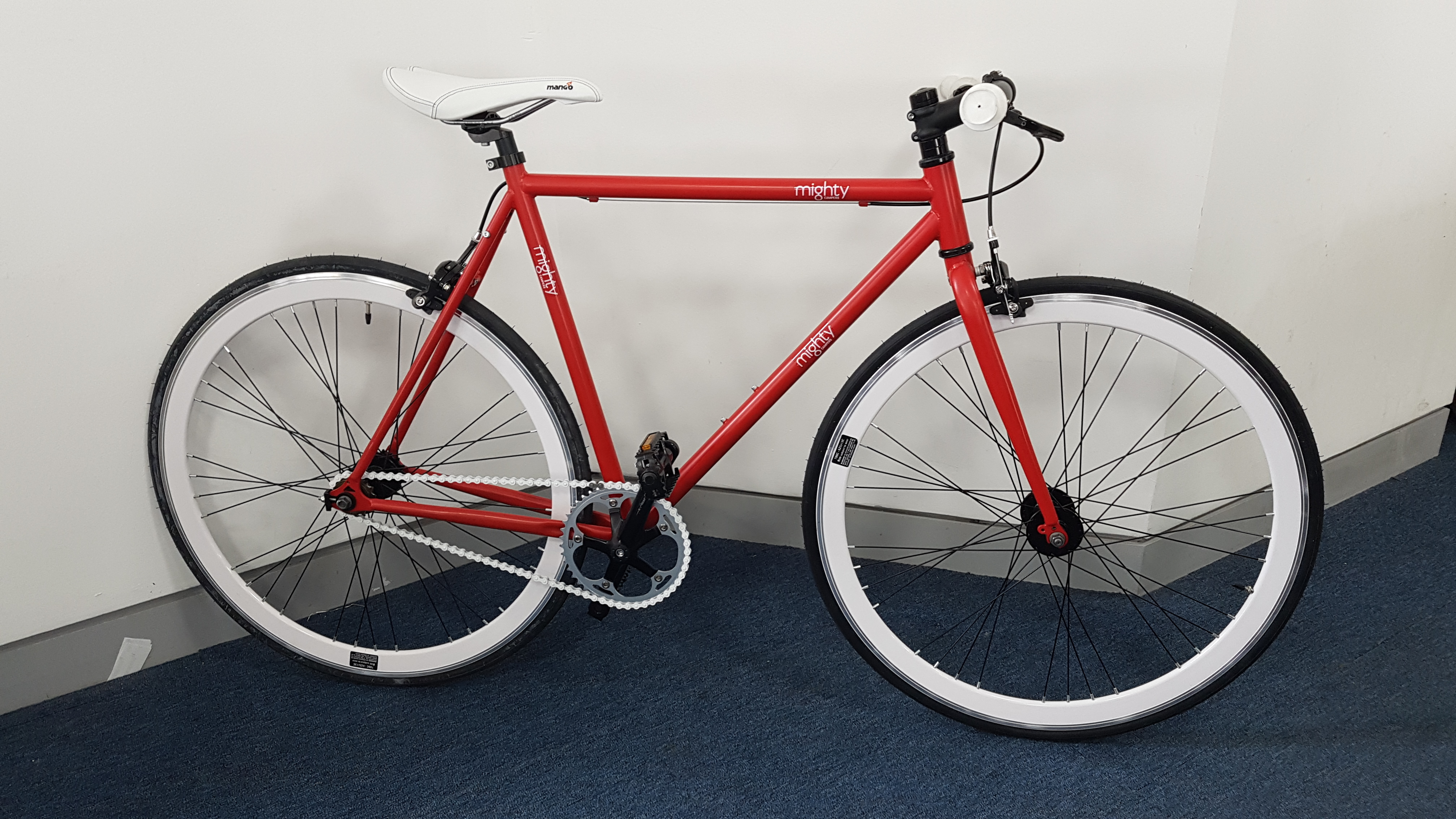
Our stakeholder survey this year involved 47 managers/stakeholder representatives from 8 stakeholder groups. For the first time we included customers in the survey.
This feedback tells us we can do better, not only in managing our strategy but also in how we communicate our performance and actions, particularly with customers.
Our stakeholders were asked to rank the strategy themes in terms of importance to them. We asked them to do the same for the programmes that sit under each theme. Their rankings were plotted alongside the company’s internal rankings. We do this each year to make sure we are focussing efforts in the right areas and reporting on the things you want to know about.
This is what we learnt about the strategic themes.
The top ranking programmes for each theme, based on survey responses, are:
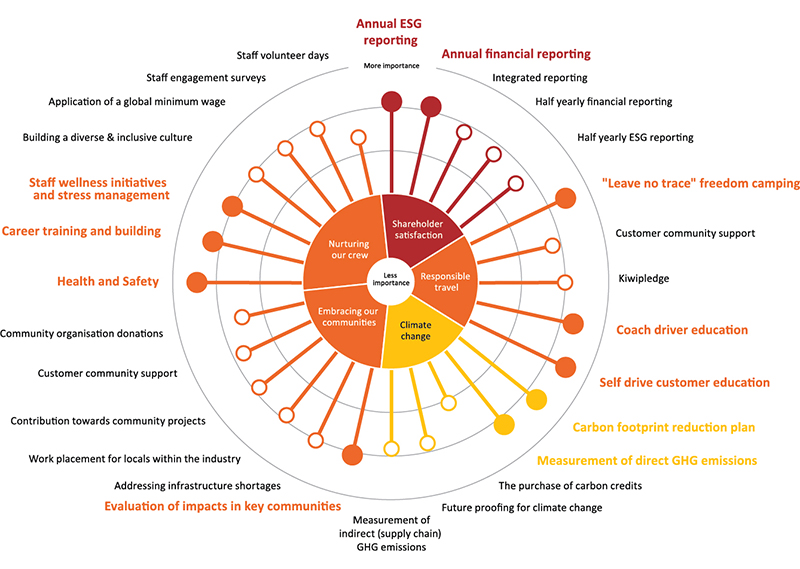
Points on the outer edge of the “web” represent extreme importance. The centre of the web signifies no importance. The scale running between the two is linear. What this means is that the further out a programme is on the web, the more our stakeholders have indicated its importance to them.
On 25 September 2015, the United Nations General Assembly formally adopted the 2030 Agenda for Sustainable Development. This included a set of 17 Sustainable Development Goals and 169 associated targets.
In 2018, the 2018 Responsible Business Trends Report, found that 69% of businesses are integrating the SDGs into their core strategy and 51% of global brands are using the SDGs as a framework for their reporting strategy.
These Sustainable Development Goals (SDGs) have created a universal framework for the private and public sector to work towards a common goal of creating a more sustainable world - that’s a good thing for us all.
This year, we decided that, as a global company, integrating the SDGs into thl’s framework was a necessity.
We do this for two reasons:
We’ll complete this full review in FY19. At the same time, we will continue to report following the GRI standards that have guided our sustainability reporting to date.
Take a look at the overview of our focus areas, you’ll see the SDGs we are currently contributing towards.
Waitomo Owners Group - Environmental Advisory Group - NZMCA - District Councils: Waitomo, Coromandel and Queenstown Lakes - Environmental Advisory - Stout Street Foundation
Banks - Board - Retail Investors - Institutional Investors - Analysts
TIA - TEC - BYATA - Tourism NZ - NZ Manufacturing Association - HPANZ - Eco tourism AU - Tourism Australia - Big 4 (AU) - Regional Tourism Authorities - Z Cycle Trail - Discovery Holiday Parks - Entertainment Book - Wheelaway holidays - Department of Conservation
Direct customers and trade partners that supply customers
Just Go - TH2 - Action Manufacturing
ATEED - Central - Local - DOC - Regional
